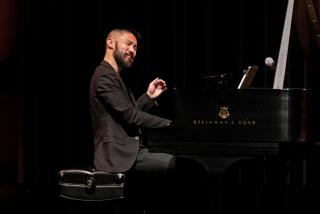Modernist precursors get their due from Mark Robson
- Share via
The Piano Spheres series has staked its claim in 20th century repertory, and Mark Robson’s latest recital Tuesday in Zipper Hall was no departure. What was different was an emphasis on works -- Scriabin’s Sonata No. 8 and Debussy’s Twelve Etudes -- from early in the century that now sound like precursors of Modernism.
With a mind to grapple with technical issues and pay homage to Chopin, Debussy wrote Twelve Etudes in 1915, three years before his death. When they are played with the correct balance of care and fickle intensity, as Robson did, the composer comes across as one with fervent imagination, his head in the clouds, and also grounded by discipline.
Myriad emotional states and technical and artistic approaches are covered in the dozen “studies.” The opener’s deceptively simple major scales yield to intricate maze work, and in others, garish extroversion is subjected to nagging or meditative counter-arguments. One chromatic etude is all blurry cascades, wittily packaged.
Scriabin’s sonata, from 1912-13, has its own restless vocabulary, with a compass of the composer’s devising. Quixotic flourishes and hummingbird trills abound, and, interpretively, Robson gave the piece its mystical due.
In the context of the entire program, one detected the lingering influence of Debussy and Scriabin on later piano composers. Messiaen’s “L’Alouette lulu,” from his “Catalog of the Birds,” is an odd yet typically Messiaenic dialogue, traversing cautiously stately chords and impertinent avian intrusions. The bird spirit wins out.
“Motto: Nege,” by the concert’s one living composer, Athanasia Tzanou, contains elements of tonal abandon -- even anarchy -- mediated by a sensuous temperament. That duality became a thematic strain throughout this engaging evening.
More to Read
The biggest entertainment stories
Get our big stories about Hollywood, film, television, music, arts, culture and more right in your inbox as soon as they publish.
You may occasionally receive promotional content from the Los Angeles Times.










